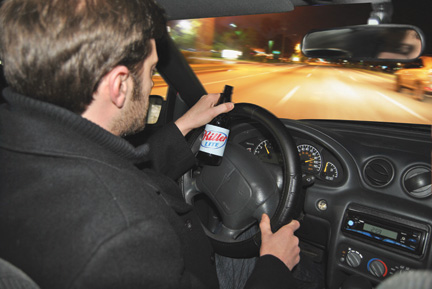Driving impaired holds legal risks that could result in permanent damage to your driving record as well as safety hazards that could result in injuring or killing yourself or someone else.
Sinclair Community College Police Chief Charles Gift said an alcohol-related fatality occurs every 30 minutes, while an alcohol-related traffic injury occurs every two minutes.
“The more you drink, the more affected you become,” he said. “Up to, and including, going into a coma or dying.”
Gift said it’s estimated that annually in Ohio, 400 people die in alcohol-related crashes, while 15,000 are injured.
“They’re all too common; drinking and driving fatalities happen a lot,” Cyber Investigation major and Oxford Police Officer Julia Huff said.
In Ohio, the legal limit for a person’s blood alcohol level while behind the wheel is .08 percent, anything over that could result in legal repercussions.
“Worst case scenario is you could get in a car accident, hurt yourself or somebody else,” Huff said. “Obviously citations, you could lose your license [and] lose your insurance.”
If a police officer suspects that a driver is under the influence, he will be given the standardized field sobriety test.
“What it is, is it’s a tool police officers use to determine whether somebody is under the influence,” Huff said. “One thing about the standardized field sobriety test that a lot of people get confused about is it’s not a pass/fail test. It’s a tool police officers use to help them determine if they’re under the influence or not.”
Three common tests given in the standardized field test are the walk and turn, horizontal gaze nystamus and the one-leg stand.
If other drivers on the road suspect another driver is under the influence, they are encouraged to report it to the local police department. They will be asked for the vehicles license plate number, description of the vehicle and the direction the vehicle is traveling.
“It takes one time and you can kill yourself or someone else,” she said.
Huff said while she was interning at a police department, she saw a fatal alcohol-related accident resulting in the vehicle hitting a tree.
“Don’t drive drunk,” Gift said. “Ask yourself before you do, ‘can I afford to lose my freedom, my job, my life or the life of someone else?’”
Gift said if someone chooses to drink, it’s his responsibility to arrange a ride.
“It’s never worth the risk. If possible, always have a designated driver,” Huff said. “Think about the consequences of your actions before you act. There’s no such thing as a good drunk driver. People will say, ‘I’ve done it 100 times, I’m good at it.’ No, you’re not. There’s no such thing as being a good drunk driver. It’s illegal.”


